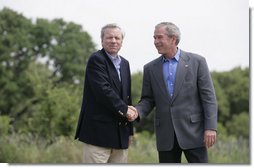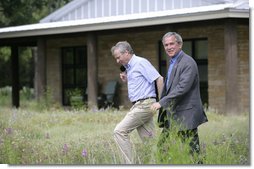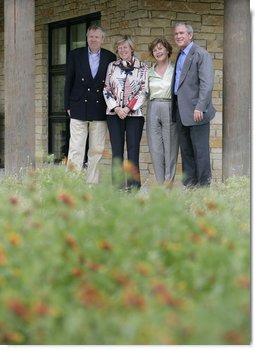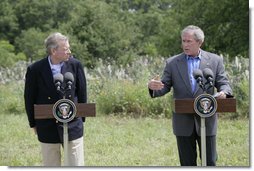
- Afghanistan
- Africa
- Budget Management
- Defense
- Economy
- Education
- Energy
- Environment
- Global Diplomacy
- Health Care
- Homeland Security
- Immigration
- International Trade
- Iraq
- Judicial Nominations
- Middle East
- National Security
- Veterans
|
Home >
News & Policies >
May 2007
|
For Immediate Release
Office of the Press Secretary
May 21, 2007
President Bush Participates in Joint Press Availability with NATO Secretary General de Hoop Scheffer
Bush Ranch
Crawford, Texas
11:22 A.M. CDT
PRESIDENT BUSH: Thank you all for coming. Mr. Secretary General, thank you very much for joining us. Laura and I are really happy to have you here at our place in Crawford. And thank you very much for bringing Jeannine with you. We had a lovely dinner last night, and that's what you'd expect when friends get together.
 I appreciate your leadership. The Secretary General of NATO has been a
strong advocate of fighting terror, spreading freedom, helping the
oppressed and modernizing this important alliance. I can't thank you
enough for being steadfast and strong.
I appreciate your leadership. The Secretary General of NATO has been a
strong advocate of fighting terror, spreading freedom, helping the
oppressed and modernizing this important alliance. I can't thank you
enough for being steadfast and strong.
We spent a lot of time talking about Afghanistan. Afghanistan is a vital mission for the United States; it's a vital mission for our allies in Europe, because what happens in Afghanistan matters to the security of our countries. We appreciate the fact that in Afghanistan you'll find NATO's largest deployment, thousands of miles from Europe, and success in that country is vital. I thank you for setting that important goal for the world to rally around. The NATO mission in Afghanistan includes more than 15,000 U.S. troops, 21,000 troops from 36 other nations, including all our allies. That wouldn't be happening without your leadership. Together, with more than 100,000 Afghan security forces we're working to support Afghanistan's elected government.
The Secretary General is also focused on ensuring that NATO commanders have the forces they need to defeat the extremists and murderers who are trying to stop the advance of that country. I pledged to the Secretary General we'll work with our NATO allies to convince them that we must share more of the burden and must all share the risks in meeting our goal.
We also appreciate the fact that Afghanistan requires more than military action. We support a long-term comprehensive strategy to help strengthen Afghanistan's democratic institutions and help create the economic opportunity that will help this young democracy survive and thrive.
The Secretary General is also determined to help transform NATO from a Cold War institution into an alliance that can continue to be effective, and that means an alliance which will meet the security threats of the 21st century. So we talked about the need to have more special operations forces and strategic airlift capabilities.
I appreciate his leadership in recognizing that in order for NATO to be effective it has to transform itself into an organization that actually meets the threats that free nations face. We talked about enlargement -- we're looking forward to going to the 2008 NATO summit in Bucharest to talk about enlargement. And I pledged to the Secretary General that I'll work with nations that are interested in becoming a part of NATO over the next year to make sure they meet the requirements necessary for a country to be accepted into NATO.
 We talked about missile defense. NATO allies and other nations recognize
the threat we face from ballistic missiles launched by a rogue state. I
appreciate the fact that the Secretary General agrees that U.S. missile
defense plans complement NATO efforts to keep all nations safe from attack.
And of course, I will continue to reach out to Russia. I sent Secretary
Gates to Russia recently to have a full and transparent conversation with
President Putin and his cabinet, to make sure that the Russians understand
that this missile shield is not directed at them, but in fact, directed at
other nations that could conceivably affect the peace of Europe. I
appreciate the fact that the NATO-Russian Council is an integral part of
the Secretary General's plans to make sure that Russia fully understands
our intentions.
We talked about missile defense. NATO allies and other nations recognize
the threat we face from ballistic missiles launched by a rogue state. I
appreciate the fact that the Secretary General agrees that U.S. missile
defense plans complement NATO efforts to keep all nations safe from attack.
And of course, I will continue to reach out to Russia. I sent Secretary
Gates to Russia recently to have a full and transparent conversation with
President Putin and his cabinet, to make sure that the Russians understand
that this missile shield is not directed at them, but in fact, directed at
other nations that could conceivably affect the peace of Europe. I
appreciate the fact that the NATO-Russian Council is an integral part of
the Secretary General's plans to make sure that Russia fully understands
our intentions.
And so, Mr. Secretary General, thanks for coming. It's been a good trip. I'm glad you're here, and the podium is yours.
SECRETARY GENERAL DE HOOP SCHEFFER: Thank you very much, Mr. President.
Let me start by, on behalf of me and Jeannine, thank you and Mrs. Laura Bush most warmly for the wonderful hospitality we have enjoyed and are enjoying on this beautiful ranch. It is really great of you to have us here. We had good conversations a moment ago, about which I'll make a few remarks, but I should start with the atmosphere and the ambiance at the Crawford ranch. That's beautiful. Thank you ever so much for that on behalf of the two of us.
Mr. President, you mentioned already a number of subjects, and if we look at those from a NATO perspective, it is very clear that NATO's operations and missions are of primary importance. And among those operations, of course, Afghanistan. If we discuss Afghanistan, I should start by saying that we, the international community -- NATO forces, U.S. forces -- are there to help rebuild and develop that nation. That nation deserves to be developed and to be rebuilt.
But we are there for other reasons, as well. Afghanistan is still one of the front lines in our fight against terrorism. And it is my strong conviction that that front line should not become a fault line. And that is why it's so important that all 26 NATO allies are committed to Afghanistan and that the whole international community, for the longer-term, stays committed to that nation.
 And I know it's tough from time to time. And I know and you know that at
any price, NATO forces and coalition forces will try to avoid civilian
casualties. We'll do that and we'll look very seriously into that -- the
military commanders, us, we, as politicians, as leaders. But let me tell
you one thing, we are not in the same moral category as our opponents, as
the Taliban in Afghanistan. We don't behead people. We don't burn
schools. We don't kill teachers. We don't plant roadside bombs. We don't
send in suicide bombers. And if we talk about innocent Afghanistan
civilians -- yes, dramatically, the result of our military actions could be
that civilians, innocent civilians are killed -- but look at the number of
Afghanistan civilians killed by the Taliban and by our opposing forces.
And I know it's tough from time to time. And I know and you know that at
any price, NATO forces and coalition forces will try to avoid civilian
casualties. We'll do that and we'll look very seriously into that -- the
military commanders, us, we, as politicians, as leaders. But let me tell
you one thing, we are not in the same moral category as our opponents, as
the Taliban in Afghanistan. We don't behead people. We don't burn
schools. We don't kill teachers. We don't plant roadside bombs. We don't
send in suicide bombers. And if we talk about innocent Afghanistan
civilians -- yes, dramatically, the result of our military actions could be
that civilians, innocent civilians are killed -- but look at the number of
Afghanistan civilians killed by the Taliban and by our opposing forces.
In brief, we are not in the same moral category there, and that's, I think, a very important mission.
I do hope, and the President said it already, that NATO as a whole alliance will stay committed to Afghanistan. It is important for that operation to succeed. And if you visit the country, if you go there, you see a lot of reconstruction and development going on. On the other hand, we'll be tough -- NATO, I said, will be tough where there's a need to be tough, our most important -- our most important operation.
The second remark -- the President mentioned this already -- we discussed missile defense, very important subjects giving vulnerabilities. We had the U.S. discussion on the so-called third site in Europe. I think it will be now up to NATO -- and I'll try to lead NATO into that direction -- but apart from the third site and the U.S. plans, there will be a NATO system which complements, which will be bolted in the U.S. system so that everybody and everything will be covered for the long-range threats, the medium-range threats, and the short-range threats -- an important element, I think.
We discussed, of course, Kosovo. While I think it's of great importance that NATO allies -- but it's now in the Security Council, and the U.S. presidency this month -- that there's full support for the Atisaari proposals. And I would like to see, as NATO Secretary General -- we have 16,000 NATO forces in Kosovo to create an element -- an environment, I should say, of stability and security -- that we see a Secretary Council resolution so that the Atisaari proposals can be brought into effect. So a resolution is important; the Atisaari proposals are good proposals.
 We discussed, of course, also at this year's NATO summit prospects for NATO
enlargement. The nations who are knocking on NATO's door need
encouragement, but they also need to perform further reforms so that we can
have a successful summit in the spring of next year.
We discussed, of course, also at this year's NATO summit prospects for NATO
enlargement. The nations who are knocking on NATO's door need
encouragement, but they also need to perform further reforms so that we can
have a successful summit in the spring of next year.
So, in brief, a great number of subjects we discussed in this informal atmosphere. Once again, thank you very much, Mr. President, for having us here. Thank you for the good conversations we had. You can rest assured that as Secretary General of NATO, I'll make the alliance work in the sense that all 26 NATO allies will participate in NATO's operations and missions, and will show the solidarity on which this alliance is built.
Thank you so much.
PRESIDENT BUSH: Thank you, sir.
We'll take two questions a side. In that there's only one questioner on the other side, it will be two questions and one question. Feller.
Q Thank you, Mr. President. The Senate is considering a vote of no confidence in your Attorney General, and some Republican senators have joined Democrats in calling for his resignation. Is it your intention to keep Alberto Gonzales as your Attorney General for the rest of your administration, regardless of what the Senate does?
And, Mr. Secretary General, if I may, you mentioned the deaths of civilians in Afghanistan. Is it your concern that those deaths are eroding the ability of NATO forces to do their work?
PRESIDENT BUSH: Let me comment on that real quick. The Taliban likes to surround themselves with innocent civilians. That's their -- part of their modus operandi. They don't mind using human shields because they devalue human life. That's why they're willing to kill innocent people to achieve political objectives.
And, obviously, to the extent that the United States is working with our NATO allies in combat, we care deeply about protecting innocent life. And to those who -- Afghans who have lost innocent civilians, we grieve with you. To the Afghan families that have been affected by the Taliban using them as shields, we have great sympathy. We do not have sympathy, however, for the tactics of the Taliban.
Now, you asked about Alberto Gonzales. He has got my confidence. He has done nothing wrong. There's been enormous amount of attention on him -- that there's been no wrongdoing on his part. He has testified in front of Congress. And I, frankly, view what's taking place in Washington today as pure political theater. And it is this kind of political theater that has caused the American people to lose confidence in how Washington operates.
I stand by Al Gonzales and I would hope that people would be more sober in how they address these important issues. And they ought to get the job done of passing legislation, as opposed to figuring out how to be actors on the political theater stage.
SECRETARY GENERAL DE HOOP SCHEFFER: Let me add that -- I'll stress again, like the President did, of course every innocent civilian fatality, death, is one too many. But in a conflict it is from time to time unavoidable -- dramatically, but unavoidable. NATO and ISAF forces still have the support of the large majority of the Afghan people.
I had a long telephone conversation with President Karzai a few days ago, on this subject. We'll avoid it; our military commanders are doing everything they can. NATO ISAF forces and coalition forces are doing everything they can. But the President talked about Taliban tactics -- we are in a different moral category. We'll be there, we'll try to, as quickly as possible, bring in, also finance to see that these people can build up their lives again, and do everything we can to avoid civilian casualties.
But I think if you talk about and ask me about the hearts and minds in Afghanistan, we still have very much the hearts and minds of the Afghan people, because they do see -- they do see that their nation, their own nation, has no future under Taliban rule. And I only have to refer to the kinds and type of Afghanistan we saw -- you and I saw -- under Taliban rule, a regime of the most gross human rights violations the world has seen.
Thank you.
PRESIDENT BUSH: Do you want to call upon the one European person here?
SECRETARY GENERAL DE HOOP SCHEFFER: I could call upon the one European person here. (Laughter.)
PRESIDENT BUSH: Thank you for coming. Brave of you --
Q Thank you very much.
PRESIDENT BUSH: -- pioneering spirit that made America great. (Laughter.)
Q I've just got one question. Mr. de Hoop Scheffer, how gezellig was it yesterday?
SECRETARY GENERAL DE HOOP SCHEFFER: It was very gezellig. I'll try to translate "gezellig" in American.
PRESIDENT BUSH: That's not in my vocabulary.
SECRETARY GENERAL DE HOOP SCHEFFER: Very friendly, cozy atmosphere. We had a very, very nice move around the ranch with Mrs. Bush and the President, my wife and I. We had a splendid dinner in the house here at the ranch. This morning, I can tell you that the President and I had a mountain bike ride together. We had our conversations. So you can speak about a very nice weekend, and we had good talks on top of it. So what can one wish more? It was very gezellig.
PRESIDENT BUSH: Steve.
Q Mr. President, Jimmy Carter unleashed some fairly harsh criticism of you over the weekend. We're you surprised by this, and do you take much stock in what he said?
PRESIDENT BUSH: Steve, you know, I get criticized a lot from different quarters, and that's just part of what happens when you're President. And I will continue to make decisions that I think are necessary to protect the American people from harm. I will continue to make decisions based upon certain principles, one of which is my strong belief in the universality of freedom.
We're at war with an enemy that is relentless and determined, and it's essential that the decisions I make protect the American people as best as we can. And it turns out my presidency is such that we talk about how -- with strong allies -- how to defend ourselves. I firmly believe that in order to protect America we must go on the offense against radicals, extremists, murderers in order to protect not only ourselves, but our allies.
And I also realize that we're involved in an ideological struggle, that these murderers, these radicals, these extremists have got a point of view. If you want to find out what their point of view is about, look what happened in Afghanistan under the brutal relationship of the Taliban and al Qaeda. On the one hand, if you're a woman and spoke out, or a woman and tried to advance, you were suppressed, in brutal fashion sometimes. And in the meantime, an enemy that hates America, plotted and planned.
And so, look, I understand some people are -- may not agree with the decisions I make. But what the American people need to know, I'm making them based upon what's best for this country.
And, anyway, thank you all for coming. It was -- what was the word?
SECRETARY GENERAL DE HOOP SCHEFFER: Gezellig.
PRESIDENT BUSH: Gezellig?
SECRETARY GENERAL DE HOOP SCHEFFER: Yes.
PRESIDENT BUSH: You talk about some good gezellig -- (laughter.)
Thank you all.
SECRETARY GENERAL DE HOOP SCHEFFER: Thank you.
END 11:38 A.M. CDT


